Are you on the hunt for the best website builder for small business? Or perhaps you're after a high-quality platform to create a mobile-friendly site?
Either way, you're in the right place because we're going to list and explore some of our favorite website builders for small business owners.
Does that sound good to you? Fab. Let's delve straight into this review!
Top Website Builders for Small Business
- Wix – Best Overall Website Builder
- Shopify – Best for Ecommerce
- Jimdo – Best Low Cost Website Builder
- Squarespace – Best for Artists
- BigCommerce – Best for Scalability
- Square Online – Best for Online Retailers
- HubSpot CMS Hub – Best for Drag and Drop Editing
- Weebly – Best for Simplicity
- Webflow – Best No Code Website Builder
- WordPress.com – Best for Blogs
- GoDaddy Website Builder – Best for AI Features
- Systeme.io – Best for Sales Funnels
- Site123 – Cheap Website Builder
Best Website Builder for Small Ecommerce Business Comparison
If you're a small business owner specializing in e-commerce, then you'll want to pick a website building solution that best reflects that. Below we've listed some of the more popular website builders on the market:
1. Wix – Best Overall Website Builder
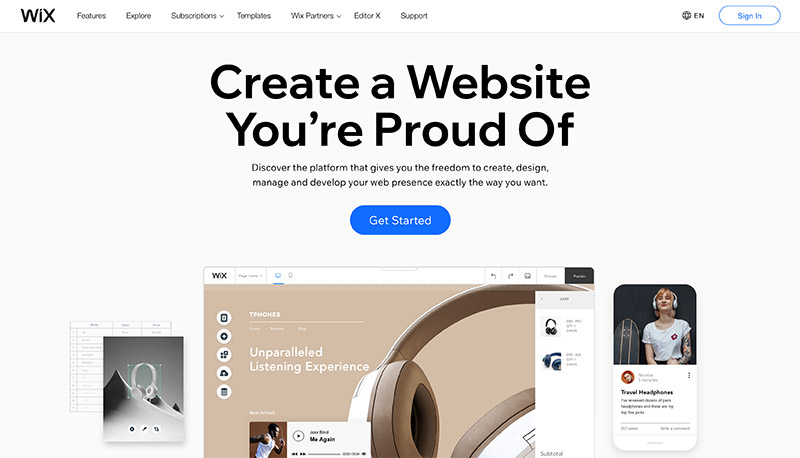
To date, over 100 million people across 190 countries use Wix. This isn't surprising, because Wix's website builder is incredibly easy to use. Wix’s drag-and-drop editor provides full creative control over the look of your site – without the need for programming.
Wix is both a traditional template-based and AI-fuelled website builder, rolled into one. Yes, you have both options!
Wix boasts templates explicitly designed for a variety of industries (in fact, there are over 500 industry-specific templates to choose from), including ones for:
- Small businesses
- Photographers
- Graphic designers
- Cafes and restaurants
- Hotels and hospitality
- Musicians
Just to name a few.
It doesn't matter what niche you're operating your small business in, Wix is bound to have a template that suits your industry.
Pricing
Wix splits its pricing plans into ‘website' and ‘business and ecommerce.'
For this review, we're just going to list the four ‘website' plans Wix has:
- The Free Plan (yes, it's completely free!)
- The Combo Plan: $17 a month (or $13 a month with a yearly contract) – This removes Wix's ads, and you can use your own web domain
- The Unlimited Plan: $22 a month (or $17 a month with a yearly contract) – This is better for larger websites as there are no limits on bandwidth and you'll enjoy a generous 10GB worth of storage
- The Business Basic Plan: $28 a month (or $23 a month with a yearly contract) – This package enables you to start selling online, and access to business apps like Wix Hotels and Wix Bookings.
The Pros
- Wix provides users with a highly intuitive and easy-to-use website editor and interface
- It’s an affordable solution and offers excellent value for money
- With Wix's AI website creator, you can have a website designed within minutes
- Wix websites boast excellent loading speeds
- Wix has a massive selection of templates to choose from
- If you want to add extra features, you can download and utilize plugins from Wix's App Market
- Wix's customer support is reportedly great
The Cons
- Once you launch your website, you can’t switch templates
- To scale your website, you'll have to upgrade to Wix's more expensive packages and/or other third-party apps
- Like many of the other platforms on this list, Wix's free plan displays their branding on your site.
- To access features like tracking and analytics, you'll have to shell out for a premium plan.
- Your site isn’t transferrable – i.e., if you decide to move away from Wix, you can't export your website, you'll have to start from scratch.
- Premium Plans are single-site only – so if you want to manage more than one website, Wix isn't the platform for you.
- Sometimes new users find the sheer choice of customization options and features overwhelming
Further reading:
- Wix vs WordPress – Which Comes Out on Top?
- Wix Ecommerce Review – The Good, The Bad and The Ugly
- Wix vs Shopify – Which is the Absolute Best?
2. Shopify – Best for Ecommerce
Shopify is probably the most famous e-commerce platform on the market – and for a good reason. Shopify provides everything you need to design, manage, and launch a digital store.
hey make it easy for newbie online sellers to do all of the following:
- Organize their products
- Design the aesthetic of their online store
- Accept customer payments
- Track and respond to customer orders
Just to name a few!
In short, Shopify is a fully integrated ecommerce solution complete with a vast array of themes for you to choose from. You can manipulate these layouts to meet all the design and functional needs of your brand. There are over 100 mobile-optimized templates designed for online stores for you to peruse and make use of. So, if you don't have an eye for design, never fear, you can still create something professional-looking.
This solution is the best-described as feature-heavy and out-of-the-box. It's effortless to get going. All you have to do is create an account with Shopify, and then they'll guide you through the process step-by-step.
Pricing
Shopify's payment plans are based on monthly billing.
- The Basic Shopify Plan: $29 a month -This provides entrepreneurs with all the basics you need to launch an online business
- The Shopify Plan: $79 a month -This is best suited to entrepreneurs hoping to grow your business
- The Advanced Shopify Plan: $299 a month – This unlocks more advanced features for scaling your brand
The Pros
- Shopify's a fully-hosted platform – so there's no need to worry about handling server maintenance and security measures…as Shopify manages all this for you.
- You can sell products via several sales channels – i.e., online, offline, social media, etc.
- Shopify supports over 100 payment processors – that's a fantastic selection!
- Shopify sites typically boast excellent performance and loading times
- You can sell both digital and physical products using Shopify
- If you're already using Shopify POS to take customer payments in your brick and mortar store, you can integrate this solution with your online shop.
- Shopify provides users with detailed and useful self-help documentation
- Shopify's app store is second to none; there are tons of add-ons you can download and use to widen the functionality of your store
- Users report being able to boost sales with Shopify's abandoned checkout recovery tool
- You get access to a highly engaged community
The Cons
- You're charged extra transaction fees if you use external gateways (i.e., any service other than Shopify Payments)
- If you want access to Shopify'smore advanced features, you'll have to pay a higher price
- Unfortunately, lots of plugins in Shopify's App Store come with a price tag
- Shopify doesn't offer email hosting
- There's no free plan available (just a trial)
- You can't delve into your website's code – which makes customization limited to your theme, your apps, and Shopify's in-built capabilities
- There aren't any out-of-the-box B2B plans
Further reading:
- Shopify Reviews – Is Shopify the Best Ecommerce Platform? Shopify Pros and Cons
- Shopify Pricing Plans – Which Shopify Plan is Best for You? Basic Shopify vs Shopify vs Advanced Shopify
- Shopify Lite Review – How It Works and When You Should Be Using It
- Shopify Plus Review – An In-Depth Guide to the Best Enterprise Ecommerce Platform
- Shopify Alternatives – Best Solutions Reviewed
- Shopify Payments Review – The Most Elementary Alternative To 3rd Party Gateways
3. Jimdo – Best Low Cost Website Builder
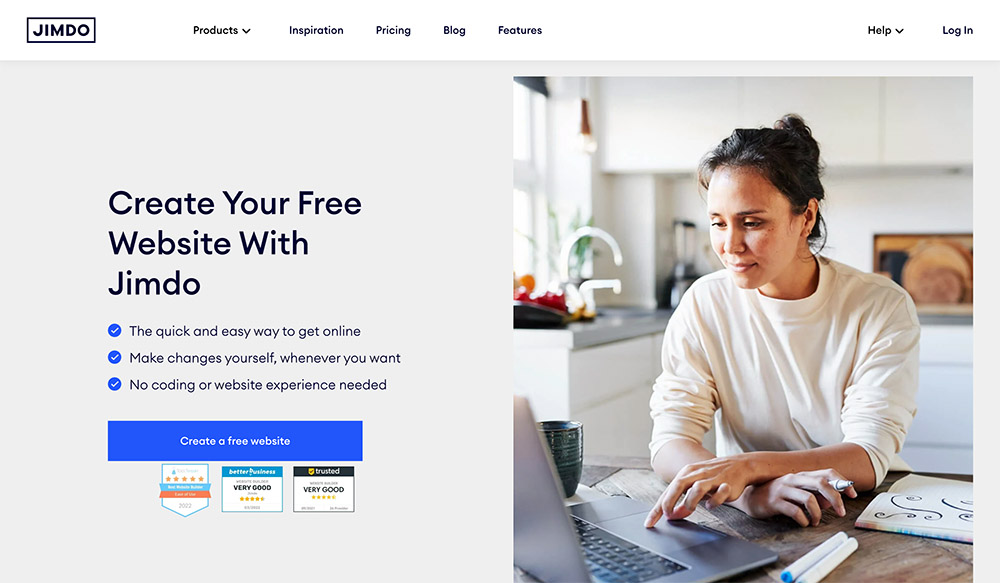
You may not have heard of Jimdo before, but that doesn't mean this German-based website builder isn’t worth considering as your go-to for your small business. It’s been around since 2007, and its website tells us that its mission is to ‘unleash the power of the self-employed and help them thrive.' To date, there are 32m+ Jimdo websites.
Jimdo bills itself as a low-cost website builder for small businesses and individuals that don't require the assistance of programmers or designers.
It's free to get started, and you can choose between two options:
- Jimdo's website builder: Answer a few questions about your needs, and then Jimdo will build a website for you in seconds
- The editor for coding experts: You can create your own website from scratch, including adding your own code.
We’re focussing on the former of these two options.
Jimdo asks you a few questions about you and your business, and based on your answers, its system creates a website for you, complete with images imported from your Facebook and Instagram pages. From your Jimdo dashboard, you can customize your website's text, change its colors, adjust images, import images from social media, and access images from Jimdo's royalty-free image bank.
The beauty of this is that you can have a beautiful website up and running within minutes without writing a single line of code.
It's also worth noting that Jimdo's focus seems European; for example, although it accepts PayPal and Stripe, other payment options are only for European countries.
Pricing
Jimdo splits its pricing plans into two categories:
- Website: aimed at individual websites and businesses that need an online presence with no eCommerce capabilities
- Online Store: for eCommerce businesses
Website
All paid plans include a free domain for a year. Prices are as follows:
- Play: £0
- Start: £9/month
- Grow: £15/month
- Grow Legal: £20
- Unlimited: £39/month
There's also a Business Listings add-on feature, with prices from £4/month, which aims to help people find you across Google, Facebook, etc.
Online Store
There are no Jimdo transaction fees on any of the following Online Store plans:
- Basic: £15/month
- Business: £19/month
- VIP: £39/month
For more info about what's included in Jimdo's pricing plans, I recommend checking out their pricing page.
The Pros
- It’s free to get started with no credit card needed; you only pay when you’re ready to launch your site
- Jimdo offers a code-free option, so there's no need to hire developers or designers
- It’s prices are reasonable
- It’s easy to sign up with an email address, Facebook or Google account
- There are several website styles to choose from, such as minimal, modern, elegant, and so on.
- The dashboard is easy to use
- All plans provide access to Jimdo's image library
The Cons
- It doesn't have native blogging capabilities.
- Unlike many of its competitors, there are no discounted annual plans.
- Support is limited for lower paid plans with a 1-2 day wait time.
- Its SEO capabilities don't enable you to edit your image alt tags.
Further reading
- Jimdo Review: Everything you need to know
4. Squarespace – Best for Artists
Squarespace is one of the least complicated website builders on the market. So, if you're a small business owner worried about the techy-side of things, Squarespace could be an excellent choice for you.
This platform has tons of beautiful pre-made website templates (for free!). It doesn't matter what you're aiming to achieve with your site. Whether it's setting up a digital store, launching a food delivery service, or creating a simple ‘contact us' page, etc., you'll probably find a template ideal for your needs.
Best of all, to make the most out of these designs, you don't have to write a single line of code! Yes, there are a few minor inconveniences (see cons section). But, within hours, you can create and launch a professional website.
Pricing
Once your 14-day free trial is over (no credit card required), there are three paid plans to choose from (all include Squarespace's free themes):
- The Personal Plan: $12 a month (you can't facilitate online customer payments with this package) so this is best for just creating a personal website.
- The Business Plan: $18 a month plus a 3% transaction fee with every online credit card payment you accept
- The Basic Plan: $26 a month (with zero transaction fees)
- The Advanced Plan: $40 a month (with zero transaction fees)
Price-wise, Squarespace is incredibly competitive. Also, Business plan users (or any of the more expensive packages) get premium apps, including the OpenTable and Acuity plugins,
It's worth noting: You'll enjoy a 25% discount if you opt for annual billing instead of the month-to-month subscription.
The Pros
- Squarespace provides a user-friendly and beautifully designed platform (it's reportedly, one of the best on the market)
- The free website templates are stunning (and there are tons to choose from)
- Squarespace provides excellent features for running both an online store and blog
- The options for managing images are excellent
- There's a fantastic assortment of import tools for transferring content over from other platforms.
- There are loads of web fonts to choose from.
- You can add a video background to your site (which is a pretty unique feature!)
- Squarespace seamlessly integrates with popular third-party tools, like Google Apps, Xero, and Mailchimp. There's also a Zapier integration which empowers you to connect with hundreds of other web applications.
- It's easy to enable an SSL certificate
- Squarespace provides a logo designing app which comes in handy if you need to create a basic, albeit professional-looking logo.
- You can also sell and deliver both digital and physical products
The Cons
- Squarespace requires a bit of a learning curve (although the drag and drop editor is easy-to-use). For instance, unless you're using Squarespace's pre-built blocks, your site isn't automatically optimized for mobile-friendliness. It also takes a while to figure out all Squarespace’s customization options (because there are so many!).
- Squarespace's SEO tools aren't as robust as some of its competitors. For instance; it's challenging to add and modify your rich snippets
- There's a glitch in Squarespace's editor where tabs and the sidebar menu cover some of Squarespace's features
- There are rumors that Squarespace is considering getting rid of its content export feature.
- The ‘Personal Plan' is limiting (to put it mildly)
- Where cookie consent is concerned, there's near-to-no support for GDPR compliance. So, you'll have to use a third-party plugin to ensure your site's compliant.
- There isn't an autosave option
- Squarespace is great if you only need one level of navigation. If you require something more complicated, this isn't the best option for you.
- PayPal and Stripe are the only available payment gateways.
- Squarespace doesn't automatically calculate VAT MOSS rates
- Squarespace's ‘Email Campaigns’ feature is a tad pricey, and there isn't a single-opt in option.
Further reading:
- Squarespace Review – 11 pros and cons of using Squarespace
- Squarespace Pricing Plans – Which Squarespace pricing plan Should you pick?
- Shopify vs Squarespace – Learn when Squarespace is a good fit for an ecommerce business and when you should be using Shopify.
- Squarespace Alternatives – Find out what is the best alternative to Squarespace
5. BigCommerce – Best for Scalability
Just like Shopify, BigCommerce is also a fabulous ecommerce platform designed to assist users in developing their store, listing products, and selling online.
BigCommerce has tons of built-in features and analytics tools - so rest assured, you should have all the functionality you need to run a profitable e-commerce site.
On the whole, BigCommerce is best for small businesses that are rapidly growing. In fact, BigCommerce claims that small businesses (that are looking to scale up), enjoy an average yearly growth of 28% when they use this solution!
BigCommerce is also used by several household names, including the likes of Toyota, Kodak, and Ben & Jerry’s. So, if it's good enough for them, it's good enough for us.
Pricing
There's a 15-day free trial, and you can also ask for a demo of the BigCommerce interface before committing your hard-earned cash. After that, BigCommerce has four pricing plans to choose from:
- The Standard Plan: $29.95 per month
- The Plus Plan: $71.95 per month (which is apparently BigCommerce's most popular package)
- The Pro Plan: $224.95 per month - This unlocks loads more features you can use to scale your online business
- The Enterprise Plan: This is BigCommerce's most comprehensive package and requires custom pricing. So, if you think you could benefit from this service, you'll need to contact BigCommerce directly.
The Pros
- BigCommerce is the most scalable ecommerce platform on the market
- BigCommerce offers an impressive suite of built-in features (more than the majority of its competitors - even with its entry-level plan)
- You're not charged transaction fees, even when you use third-party payment gateways.
- You get access to excellent reporting tools on all of BigCommerce's pricing plans
- You can utilize Bigcommerce's built-in product review features.
- It's easy to sell in multiple currencies (especially with the ‘Stencil’ theme)
- The 'abandoned cart saver' tool is more sophisticated in comparison to similar features offered by its competitors.
- You can register an unlimited number of staff accounts (again, on any plan).
- BigCommerce offers an array of out-of-the-box discounting / coupon tools.
- Customers can upload files while making online purchases
- It comes with a built-in blog.
- Bigcommerce has a decent relationship with Braintree, so you can take advantage of cheaper-than-usual Paypal transaction fees.
- If you're selling products that have lots of variants, Bigcommerce provides a flexible and easy-to-use solution
- You can sell across multiple channels - including your site, Facebook, Instagram, Pinterest, etc.
- Access to fantastic SEO tools. Bigcommerce makes it simple for you to create short URLs, and AMP formats are available for all of BigCommerce's templates. You'll also benefit from automatic image optimization (all these SEO features are included in each pricing plan).
The Cons
- BigCommerce's terminology is somewhat complicated, so it might be unsuitable for complete beginners
- By comparison to its competitors, it's expensive to access BigCommerce's abandoned cart tool.
- Annual sales limits are placed on users, and if you exceed these restrictions, you'll have to upgrade to a pricier monthly plan.
- Some users say Bigcommerce's mobile app could use some improvement
- The in-built blog doesn't facilitate RSS feeds.
- Some of the more advanced features can take a while to get to grips with
Further reading:
- BigCommerce Reviews – 20 BigCommerce Pros and Cons
- BigCommerce Pricing - How Much Are You Going to Pay With BigCommerce?
- BigCommerce vs Shopify - The ultimate comparison
6. Square Online - Best for Online Retailers
If you're a small brick and mortar store, then Square Online could be a great launching pad for your small business. This is especially true if you're already using some of Square's other products like Square POS.
Just like the majority of the other website builders in this list, there's no need for technical or coding know-how. You can use Square's Online Store to do the following:
- Process online customer payments
- Integrate other online shopping cart options
- Build beautiful product pages.
BUT - if you want to access Square's more sophisticated options like tracking and analytics, you'll have to upgrade to one of their more expensive packages.
Pricing
Square Online offers a free plan where you only have to pay credit card processing fees - which are (2.9% of each sale + $0.30).
However, if you're a small business owner that needs more from their online store, there are three options to choose from:
- The Professional Plan: $16 per month, or $12 per month when you pay annually - this allows you to connect your site to a custom domain and unlocks site statistics and extra marketing features.
- The Performance Plan: $26 per month, or $29 per month when you pay annually
- The Premium Plan: $72 per month, or $79 per month when you pay annually. This package unlocks access to third-party integrations, custom code, and product badges. You can even integrate your Square account with your Facebook ads, launch pop-up notifications, and utilize advanced ecommerce analytics - just to name a few!
As you can see, when it comes to the critical differences between Square's freemium version and their most expensive package - one's an incredibly basic solution for your online store, and the other is a package that's explicitly designed for ecommerce.
For instance, the free plan doesn't include unlimited storage, whereas that's something you get with all of Square's paid-for plans. You'll also have to put up with Square's ads on your site if you use their free option, whereas this is removed from their premium packages. Plus, you can't instantly link your store to your social media profiles, unless you've subscribed to a paid-for plan.
The Pros
- Square offers users a predictable pricing structure (rest assured, there are no hidden fees - you won't have any nasty surprises when you check your bank statement!)
- The free option is genuinely free forever (except for the card transaction fees)
- Square provides an all-in-one payment system
- It's incredibly simple to upload products and start selling online
- If you're already using Square POS, it's an excellent option for linking your POS and digital store together
- It seamlessly integrates with other ecommerce solutions
- There are loads of high-quality website themes to choose from
The Cons
- Square Online's approach to shipping charges is awful. You can't set different prices for wares that cost more to send. So, depending on your product catalog, not having access to adjustable sipping rates can be a real problem!
- In comparison to its competitors, its customer support and order fulfillment tools are somewhat lacking.
- It's not uncommon for Square users to experience account stability issues
- Square's customer support could do with a bit of improvement
- Some users complain that Square's more advanced features are restricted to their higher-cost plans.
Further reading:
- Square Online Review - Everything You Need to Know
- Shopify vs Square - The Battle of the Ecommerce Platforms
- Square Pricing and Fees - The Ultimate Guide
7. HubSpot CMS Hub - Best for Drag and Drop Editing
HubSpot is more than just a website builder; it’s a CRM platform that is designed to help small businesses grow in scale.
HubSpot CMS Hub has a ton of features that will help you optimize your site for all your marketing and sales needs. The CRM is at the center of everything. It collects all of your visitors’ information and logs each and every one of their interactions with your brand so that you can offer a much more personalized experience on your site and in your communications with them.
Pricing
HubSpot CMS Hub has three paid plans. The Starter plan is ideal and more than sufficient for small businesses because it includes everything you need to get your site up and running while keeping it professional.
Furthermore, you also get access to the free HubSpot CRM as well as all of HubSpot’s free tools for marketing, sales, customer service, and operations. All of these tools work seamlessly with your website builder and contribute to optimizing both your website and business.
Here is the breakdown of their paid tiers:
- Starter: $25 a month
- Professional: $400 a month
- Enterprise: $1,200 a month
You can also try out the software for free with a 14-day trial.
The Pros
- HubSpot’s software is easy to use and highly intuitive. The drag and drop page builder works very smoothly and gives you an instant preview of what your visitors will see.
- Get instant SEO recommendations as you type your content to ensure you’re always following best practices for your site to rank.
- The website builder is natively integrated with the HubSpot free CRM, which allows you to customize your site’s content, marketing emails, and more.
- In addition to the CRM, you get access to HubSpot’s free tools, such as email marketing, forms, live chat, chat bots, ads software, and more.
- HubSpot CMS takes A/B testing one step further with adaptive testing, a feature that allows you to create multiple variations of the same page. HubSpot automatically identifies the winning variation and makes sure that’s the one most of your visitors see.
- You can use serverless functions to easily add interactive elements to your site, like event registrations and calculators.
- HubSpot provides 24/7 security monitoring and threat detection. Their security team personally takes care of your website’s security with both automated and manual checks for attacks, potential abuse, and other anomalies.
The Cons
- HubSpot’s website builder does not have a free plan and starts at a higher price point than most software in the category.
- You will need to use third-party applications to have a full ecommerce website.
8. Weebly - Best for Simplicity
Generally speaking, if you want to launch a simple and low-maintenance website, Weebly could be a good option for you. It's best for traditional brick-and-mortar stores that don't need more than one navigation menu or a sophisticated about page. There are tons of handy website building features and tools...just as long as you're willing to shell out for Weebly's more expensive packages.
Like Squarespace, Weebly also offers a drag-and-drop website editor so that you can create a fully-functioning site with minimal effort.
Pricing
- The Connect Plan: $5 a month (you can't accept online customer payments with this package)
- The Pro Plan: $12 a month (with a 3% credit card fee when making an online sale)
- Business Plan: $25 a month (no card fees)
- Performance Plan: $38 a month (no card fees)
You don’t have to pay extra to access Weebly's free website templates. However, if you want one of their premium designs, you're looking at a max of $49. There are also lots of free apps, but some are as expensive as $150 a month - so be sure to keep all this in mind as you budget.
The Pros
- You get access to professional-looking templates
- Weebly websites (generally) boast reliable and quick loading speeds
- Weebly's dashboard is incredibly intuitive as is their website editor
- You can download and use the Weebly mobile app - which comes in handy for managing your site while you're on the run.
- You get your own free domain name with all of Weebly's paid-for plans.
- You'll receive a free SEO report (when you install the MarketGoo App)
- It's easy to upgrade - so if you buy one of Weebly's cheaper plans and then later down the road you need to scale to a better package, you can do so at any time.
- You can access Weebly's app center - although this isn't the biggest app marketplace, it's still pretty impressive
- You can export your entire site - so if you decide you want to leave Weebly and use a different platform, that's entirely possible.
The Cons
- There's an extra cost for launching an e-commerce store.
- Weebly's image editing tool isn't great - you're better off editing your photos offline.
- Without downloading and using extra apps, Weebly's blogging functionality looks pretty amateurish - so if you and your team are primarily bloggers, then look elsewhere.
- Weebly doesn't offer a wide array of customer service options (in comparison to its competitors). You have to purchase Weebly's more expensive plans to access their telephone and priority customer support.
Further reading:
- Weebly Review - Here's a quick run-through of what consumers should expect if they opt for a Weebly website-builder account.
- Weebly vs Shopify - What You Need to Know
- Weebly Pricing - In this article we talk about all Weebly pricing, from the plans to the extras such as themes, hosting, and apps.
9. Webflow - Best No Code Website Builder
Webflow provides an impressive suite of features for building your own website, as well as a decent selection of fully customizable website templates.
Webflow might be your ideal solution if incredible self-help materials are vital to you. Not only does Webflow provide excellent written content, but they also have tons of in-depth video tutorials. They've even published lists of resources to help with specific topics. How handy is that?!
Pricing
Webflow has loads of different pricing plans - so we're not going to cover them all here. Your best bet is heading over to their pricing page to see for yourself exactly what they offer.
Instead, we'll explain the basic structure of their packages:
First off, they have a 'free forever' option. You can use this plan for as long as you want, without handing over your credit card info. You'll get access to Webflow's full website design features and content management system (CMS), so it's fantastic for testing whether Webflow meets the needs of your small business.
You'll also get access to over 100 hours of tutorials, and you can get started with two projects. However, you'll have to publish your site on Webflow's subdomain webflow.io - which, of course, doesn't look very professional.
Okay, so when you outgrow Webflow's free website builder, you'll want to upgrade to one of their paid-for packages, which Webflow breaks down into two types:
- Site plans: You can connect your Webflow website with a custom domain, invite collaborators, and enable an online customer checkout.
- Account plans: These programs unlock extra features. For instance, you can add more projects, get access to code exportation, and you can publish your own logo to your client-facing editor. Or, you can even create a team dashboard if you have staff working together on the same projects.
The Pros
- Webflow's freemium version is very impressive.
- Webflow puts a heavy focus on their customer experience; there are tons of resources for you to use (in fact, over 40 online lessons!)
- You can export Webflow websites to other platforms
- This is a fabulous option if you're a small business owner with web design experience as you can access your website's HTML and CSS code
- You can either utilize Webflow's pre-built templates or start from scratch
- You can integrate and use multilanguage solutions
- All of Webflow's templates are mobile-optimized
The Cons
- If you're utilizing Webflow's more advanced features, there's a steep learning curve. Some customers report that the user interface is somewhat intimidating (at least to begin with).
- Webflow makes it complicated to run and manage a sophisticated ecommerce website because you'll have to download and use several plugins and add-ons. These more advanced features aren't built-in. So, if you're primary focus is online selling, Webflow isn't your best option.
- In comparison to its competitors, Webflow offers a limited number of templates to choose from
- Users report that having experience with Photoshop and InDesign can be useful - which, of course, not every small business owner has!
- There's no refund policy which is slightly concerning
- Some of their packages are incredibly pricey - so if you're on a strict budget, Webflow isn't ideal - especially for creating just basic websites.
Further reading:
- The Ultimate Webflow Ecommerce Review: Is Webflow The Best Website Builder?
- Webflow vs Shopify - It Depends on Your Experience
- Webflow vs WordPress - Which Should You Go For?
10. WordPress.com - Best for Blogs
WordPress.com is a website builder and hosting company that provides small business owners with an all-in-one solution capitalizing on WordPress.org’s web building technology.
If you want to create a basic website for your traditional brick-and-mortar business or just a more sophisticated blog - WordPress.com isn't the right platform for you. There are other website builders on this list that enable you to do this more quickly and efficiently - namely, Wix and Squarespace.
However, if you want to create something more complex, or if you're launching an online store, WordPress is undoubtedly worth considering. That's providing you have the time and know-how (or the will to get to grips with the solution). Once you figure out how to use WordPress to the fullest, there are next-to-no limits with what you can do.
If you're new to web design, then start with WordPress’s visual website builder. This permits you to create and modify content blocks with ease.
But, if you want to shake up the entire look of your site, just pick a new theme (there are loads of options - both free and paid). Failing that, you can tweak your website’s code and utilize the plugins over on WordPress's app store to bring your exact vision to life.
So, to summarize, if you're a small business owner with CSS experience (or have time to learn code), WordPress could be the perfect fit.
Pricing
There are three paid-for options: the Personal, Premium, and Business packages. There's also a free bundle. This is amazing for getting a feel for WordPress' interface. However, it's not great for business use, because you'll have to put up with WordPress' ads on your site. You'll also have to use WordPress's subdomain - neither of these limitations exudes professionalism.
Here's how much WordPress's paid-for plans will set you back:
- Personal: $5 a month
- Premium: $8 a month
- Business: $25 a month.
Unsurprisingly, most entrepreneurs use the Business plan, as this is the only package that provides access to plugins, SEO tools, and integrates with Google Analytics. You can also upload your own WordPress themes. It also offers unlimited storage, so you can upload as many pictures and/or videos as you want!
The Personal package, although inexpensive, has a few severe limitations:
- You can’t access and use any of WordPress's plugins
- You can’t customize your site’s appearance as much
- You can’t use a PayPal button to accept payments
- There isn't much storage available
In light of all of that, the Personal bundle is best for creating straightforward websites.
As you may have already guessed, the Premium program entitles you to more than the Personal plan - but not as much as the Business option.
You'll get:
- More storage
- More customization options (like editing your site’s CSS)
- Access to Premium themes
- You can add a PayPal button.
So if you're only making a few online sales a month, the Premium plan could work for your small business.
Other Costs:
- Some plugins and themes are free (but others have a price tag, so factor that into your budget - the average premium WordPress theme costs $59.10).
- You'll also have to buy your own domain after your first year
The Pros
- You'll enjoy an incredible degree of customization (especially if you boast coding know-how)
- There are thousands of plugins you can utilize (over 54,000 to be precise).
- There are thousands of beautiful themes to choose from. These days, most WordPress themes have a responsive design.
- WordPress has an excellent reputation
- With its roots as a blogging platform, WordPress provides an admin panel that's effortless to navigate. It's incredibly easy for users to modify their web pages and upload new content. Not to mention, it's relatively simple to organize your content (even for newbies).
- WordPress.com does an excellent job of promoting SEO best practices - there are tons of SEO plugins you can download and use for free - for instance, Yoast SEO. This app helps you to optimize your content for your chosen keyword and modify your meta tags and descriptions.
- WordPress is open-source software, so you and your team can edit your website's source code. Also, it's not uncommon for WordPress programmers and web developers to share snippets of code online. Needless to say, by using these snippets, you'll save lots of time and development costs.
The Cons
- If you're new to the world of web design, WordPress is a steep learning curve
- You can't access WordPress's plugins and SEO features unless you shell out for their most expensive plan
- You're responsible for installing all necessary website updates, which can be a tedious and time-consuming business (albeit essential for keeping your site as secure as possible). This can be exceptionally monotonous if you're using a premium WordPress theme, as these are typically updated regularly. However, sometimes these updates create small formatting issues that you'll have to take care of.
- On the subject of cybersecurity, as WordPress is an open-source platform, it's attractive to potential hackers. So, that's something to watch out for!
- Some WordPress themes contain lots of unnecessary generic code, which slows down the speed of the site. So, unless you're very knowledgable about WordPress, it can be a challenge to know which snippets of codes you can do without.
Further reading:
- WordPress.com Review - For Hobbyist Bloggers and Those Who Want to Practice WordPress
- WordPress.com vs WordPress.org - Which do you need?
- Best WordPress Hosting – The Top 5 WordPress Hosting Services Reviewed and Compared
- The Best Free WordPress Ecommerce Plugins
- 20 Best Ecommerce WordPress Themes
11. GoDaddy Website Builder - Best for AI Features
If you've ever heard of GoDaddy, you probably associate them with domain names and web hosting. But, now, they also offer a website builder!
On the whole, this platform is best described as beginner-friendly. It offers a wide variety of mobile-optimized website templates - which is a plus!
Generally, GoDaddy's website builder is best for small business owners that are time-conscious. So, if you want to create and launch a professional-looking website - and fast...GoDaddy's worth considering.
Yes, this website builder isn't the sexiest option on the market, but for what it lacks in flair, it makes up for in practicality and ease of use.
Pricing
GoDaddy offers four pricing plans for you to pick from. All packages come with 24/7 customer support and web hosting. However, it's worth noting; domain names aren't included. Also, if you want to launch an e-commerce store, you can only do this with GoDaddy's more expensive “Ecommerce” plan.
With all that in mind, here's a quick rundown of GoDaddy's costs (these are the monthly prices for a one-year contract):
- The Basic Plan: $10 a month - ideal for small business owners that want a simple, ad-free website.
- The Standard Plan: $15 a month - This includes https protocol and comes with a PayPal integration.
- The Premium Plan: $20 a month - This unlocks email marketing tools, social media integrations, and your website is optimized for speed.
- The Ecommerce Plan: $25 a month - Unsurprisingly, this comes with ecommerce features. For instance, a choice of payment processors and an abandoned cart recovery tool.
The Pros
- You can use GoDaddy's website builder for free during your first month
- The e-commerce plan offers decent functionality - you can add up to 5,000 products and customize your shipping options.
- You get access to 24/7 telephone and live web chat support. That's as well as an extensive self-help center. GoDaddy even provides country-specific phone numbers for over 50 locations around the globe. The phone support is said to be excellent. Support agents are apparently polite and provide clear and actionable solutions to problems. It's also worth mentioning when using GoDaddy's live chat option; it gives an accurate estimate of the waiting time.
- There's an excellent selection of templates for small businesses- and if you chop and change between them, your site reformats automatically
- GoDaddy provides automatic backups of your website.
- The drag-and-drop website builder is exceptionally intuitive. To edit your web pages, you just click the website element you want to change and customize it from there. Your customization options display in the right-hand editing bar (color, alignment, etc.) Also, each web page is divided into sections, which further simplifies customization. You can even commission changes in bulk to entire sections just by selecting the 'Layout' button.
- You can harness the power of artificial design intelligence (ADI) to create your whole website - you just need to answer a few questions first!
- It's an affordable option
The Cons
- You don't have a massive amount of creative freedom, so if you're in an artistic niche, GoDaddy's website builder won't be a great fit.
- The website builder lacks style
Further reading:
- GoDaddy Website Builder Review - Can it possibly match up to the scale of other GoDaddy services?
- GoDaddy Online Store Review - Is GoDaddy Online Store worthwhile?
12. Systeme.io - Best for Sales Funnels
Systeme.io, like Squarespace, aims to provide all the tools you need in one platform. But, unlike Squarespace, which focuses on first-rate visual design, sSysteme.io concentrates on providing a powerful marketing suite.
With this website builder, you can create websites, landing pages, email campaigns, sales funnels, marketing automations, webinars, online courses, and even affiliate programs. In addition, it comes packed with features like popups, forms, and much more.
You don’t need to write a single line of code to utilize any of these features. Instead, everything is fully integrated into a straightforward dashboard and visual editor.
Pricing
Systeme.io has four pricing plans to choose from, including a completely free option.
- The Free Plan: Unlimited emails, storage, and students per month, limited to 2,000 contacts. You get access to most features but it’s limited:3 sales funnels, one custom domain, one online course and blog, etc.
- The Startup Plan: $27 per month, increases limits on all features and allows you to store 5,000 contacts.
- The Webinar Plan: $47 per month, unlocks 10 webinars, a greater allowance across all marketing features, as well as a max limit of 10,000 contacts.
- The Unlimited Plan: $97 per month, provides free migration and unlimited everything.
Systeme.io requires you to upgrade to a paid plan quite quickly if you want to enjoy its features to the fullest. So, it might not be as cheap as some of the other website builders we've discussed. Still, because it offers such a wide range of marketing features, it's very competitive for the price.
Worth noting: You can also save 30% and get free migration by opting for annual billing.
The Pros:
- Systeme.io combines all essential online business tools into one suite
- The Free plan provides access to all features, which is excellent for trying before buying
- You can send unlimited emails
- You can create online courses and webinars with the same, familiar editor
- There's no need to rely on other tools, thanks to its complete toolkit
- For what's offered, pricing is reasonable
The Cons:
- Design flexibility is a little limited and not as advanced as that of other website builders
- There's no indication of how many templates you can choose from or what their quality is like
- The many features on offer sometimes equate to a bit of a learning curve
- You’ll quickly have to upgrade plans to be rid of limitations
- You can't integrate with many third-party apps
👉 Read our Systeme.io review.
13. Site123 - Cheap Website Builder
Site123 is fabulous for developing and launching your site in record-breaking time. However, if you're in a creative niche, or if presentation matters to you, Site123 isn't the website builder for you.
We can't deny that the result you get with Site123 is a tad dated. Plus, in comparison to its competitors, its features are somewhat lacking. So, you'll have to weigh up whether the convenience Site123 provides...outweighs the aesthetic of your site. Of course, this a decision only you can make.
Pricing
All of SITE123's paid-for plans provide a 14-day money-back guarantee. There's also a free program that offers the following:
- 500 MB of storage
- 1GB of bandwidth
- A subdomain
It's also worth noting, with the free plan, you'll have to put up with Site123's ads plastered all over your website. To get rid of these, you'll have to upgrade to a paid-for account.
If you need more than the freemium version, you'll want to pay for the premium package, which will set you back $12.80 a month.
This is what you'll get for your money:
- A free web domain for the first year
- 10 GB of storage
- 5 GB of bandwidth
- The removal of SITE123's floating tag
- You can connect your website with your own custom domain name
- Access to e-commerce features
The Pros
- There's a free plan
- Site123 is fantastic where SEO is concerned- your website's built using amazing code that delivers excellent SEO results.
- The premium plan is incredibly affordable
- Site123 makes website creation incredibly quick and easy
- Site123's customer support is excellent - especially over live chat
- Site123's website's boast responsive web design - so your site will look fantastic on all kinds of devices (desktops, tablets, smartphones, etc.).
- There's a variety of ready-made website layouts to pick from.
- You can change your website template as many times as you want - whenever you want.
- There are 56 different languages you can use as default to base your website on
The Cons
- Site123's feature set in minimal - both in terms of design and other technical aspects.
- You can't access the source code or add coding snippets to your website. So, if you have any programming know-how (and want to use it), Site123 isn't the best solution for you.
- Similarly, if you're looking for a platform to handle complex e-commerce needs, Site123 isn't ideal. Yes, there are some great e-commerce features, but these are only suitable for small to mid-sized stores. If you're planning on growing your online business, you'll soon outgrow what Site123 has to offer.
👉 Read our Site123 review.
Ready to Start Using the Best Website Builder for Small Business?
We hope that having read this article, you now have a better idea of which solution is the best website builder for small business! It's now over to you which one you'll opt for!
Have you ever used any of the platforms we've listed in this article? If so, we would love to hear your thoughts in the comments box below. Speak soon!

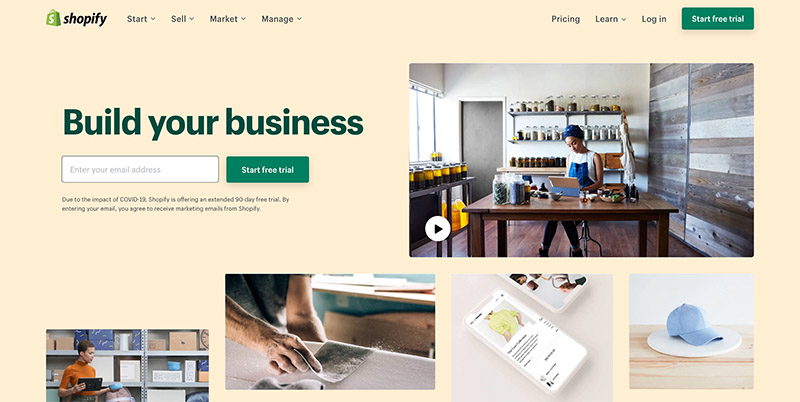
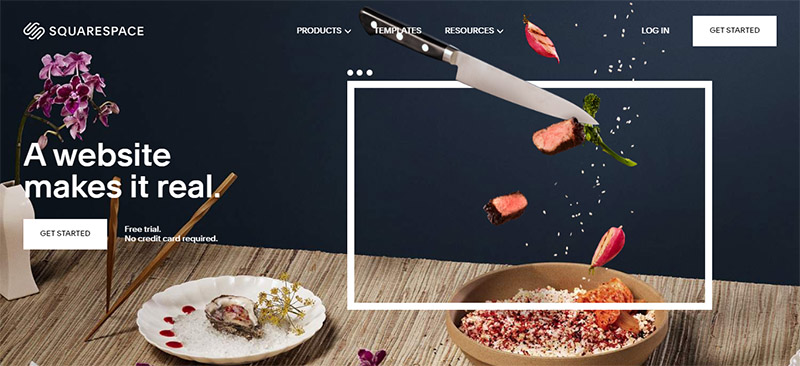
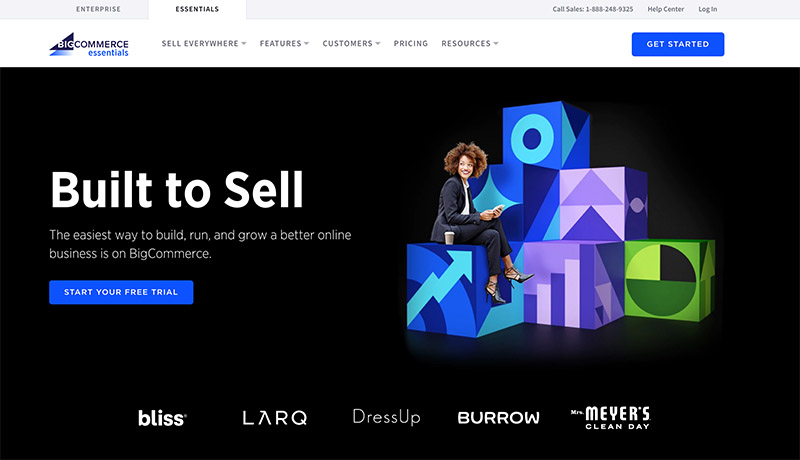
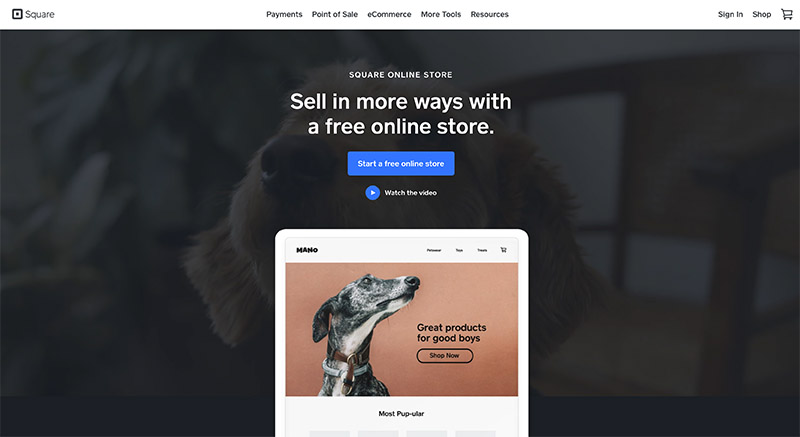
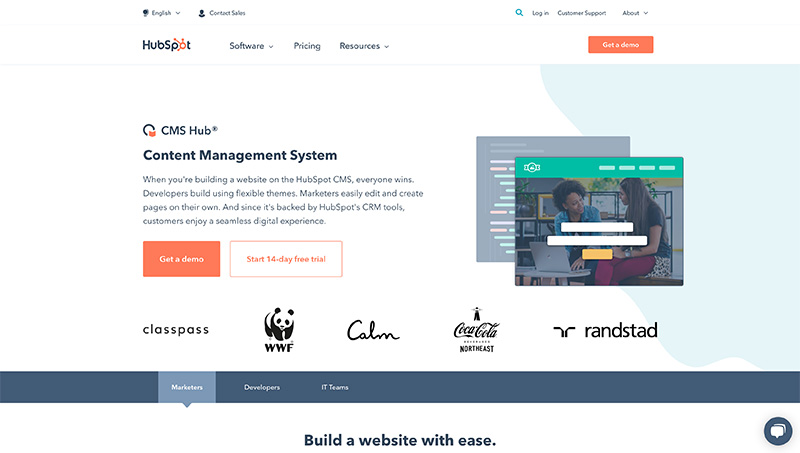

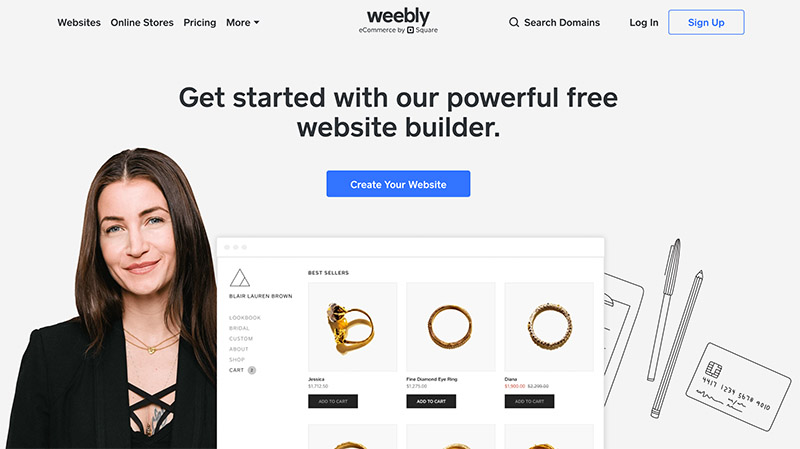
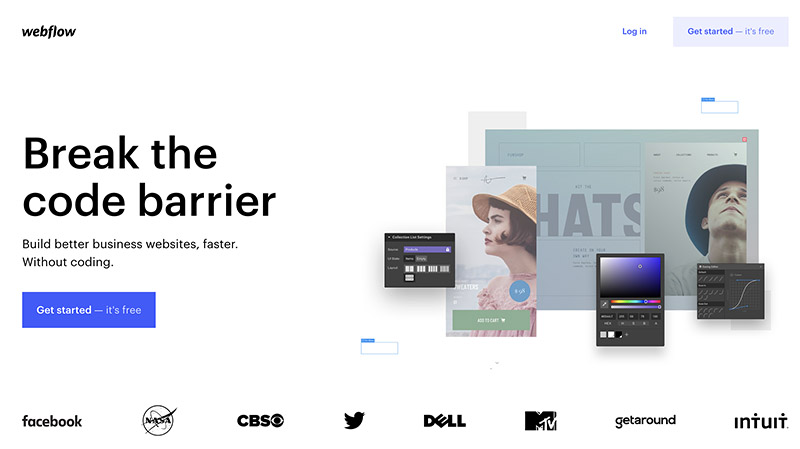
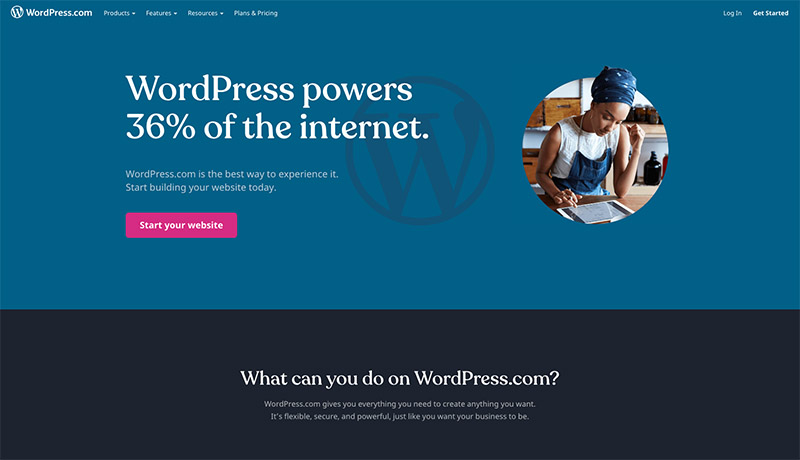
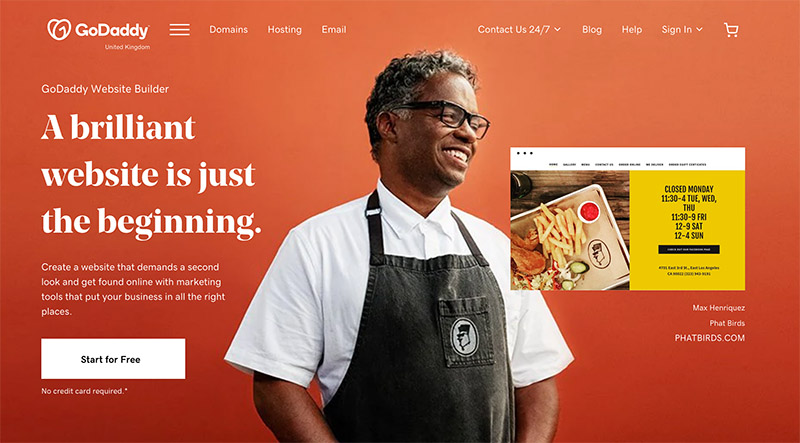
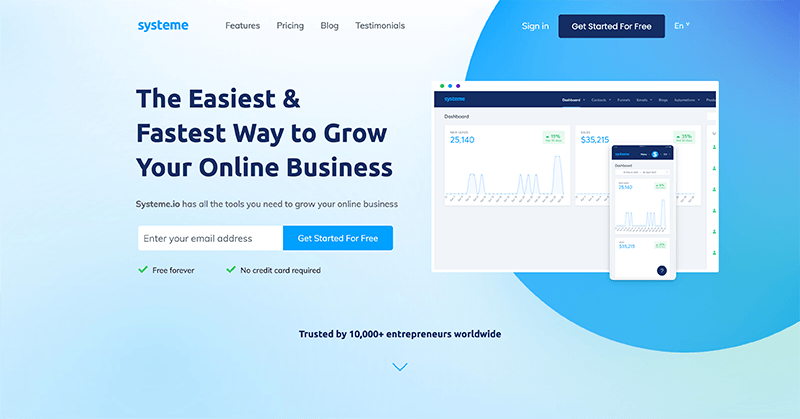
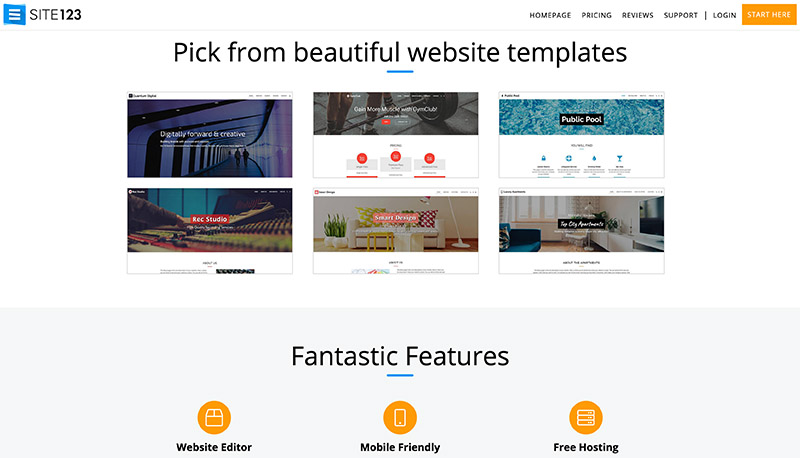


Comments 0 Responses